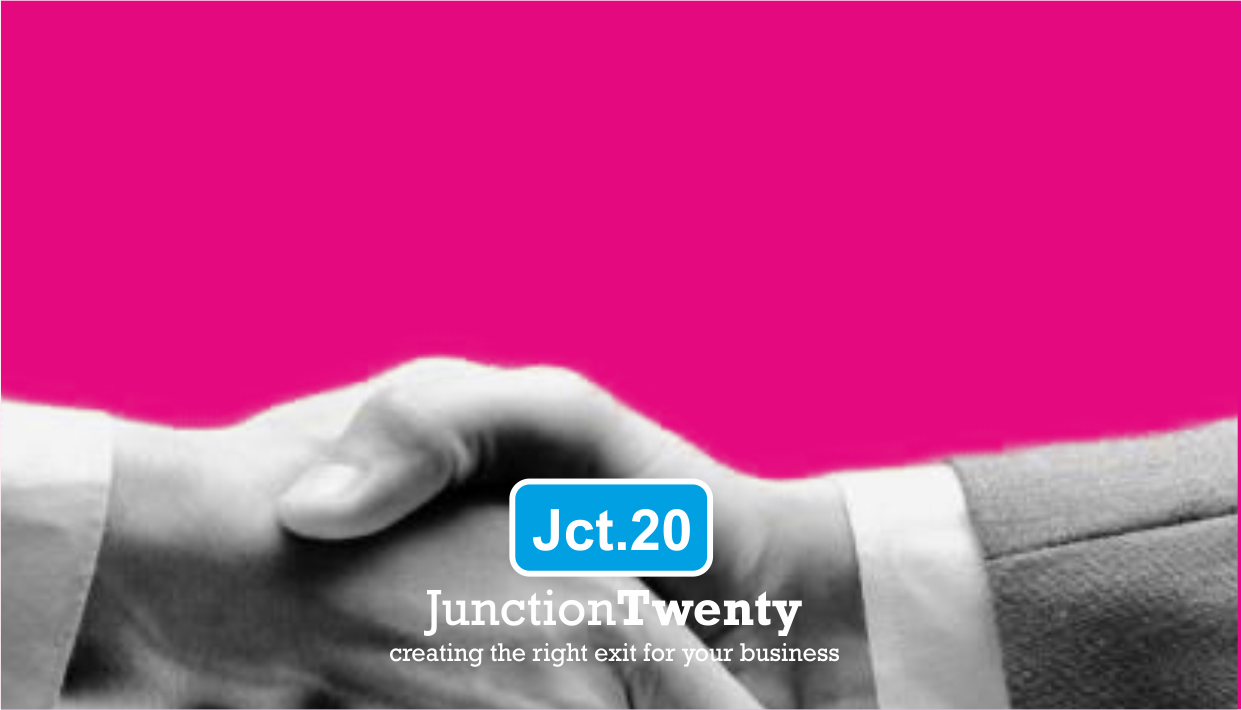Locked Box or Completion Accounts
Stuart Mason • 24 September 2024
Locked Box or Completion Accounts - What's BEST For YOU When Selling Your Business?

Locked Box vs Completion Accounts: A Small Business Owner’s Guide The Your Labrador Can Understand.
So, you've decided to sell your business, and you’re working hard with the Junction 20 content to PREPARE your business and sell for more. Awesome.
It’s your baby, your pride and joy. It's been a wild ride, from burning the midnight oil (and probably burning a few kitchen appliances) to celebrating that first sale that wasn’t to your mum.
Now, you're on the brink of passing the baton, and suddenly you're hit with terms like "Locked Box" and "Completion Accounts." If you're scratching your head thinking, "Are these types of padlocks? Do I need a key for this?", don't worry.
We're going to break it down for you, with a dash of humour to keep things light, and write it in a way a labrador will understand. Why? Because it annoys us that so many brokers and consultants use weighty text and terms in a bid to justify fees.
What on Earth is a Locked Box?
Let's start with the Locked Box mechanism, which - spoiler alert - doesn't involve actual padlocks, handcuffs or safes. Sorry to disappoint. So, keep your handcuffs for other things, moving swiftly along…
The Locked Box is a financial system used in business sales. It's all about freezing the accounts of your business at a specific date (known as the "Locked Box Date"). Think of it like a financial time capsule: you decide on a date when the accounts are "locked," and after that, you, as the seller, agree not to take out or put in any sneaky last-minute transactions.
Here’s a very relatable scenario:
• Imagine you’re selling your local bakery (you’ve made a killing with those award-winning scones).
• The buyer and you agree that on 31st March, you’ll lock the box.
• From that point on, the buyer will treat the business as though it were already theirs. No sneaky spending, like ordering yourself a new industrial oven "on the house" after the agreed date. Everything is frozen, except for regular operational stuff like paying your staff or, in the bakery’s case, buying flour (because we can’t have a flour-less bakery).
You, the seller, pocket the business’s profits up until 31st March. After that, anything the business makes or spends is the buyer's responsibility.
Locked Box: Pros and Cons
Pros:
• Simplicity: The price is fixed, no surprises.
• No ongoing haggling: Once that box is locked, there’s no need for you and the buyer to argue over receipts or sneaky post-sale adjustments.
• Predictability: Both you and the buyer know what’s happening from the get-go.
Cons:
• Trust Issues: The buyer has to trust you haven’t drained the business’s coffers before locking the box. So, no cheeky bonuses or splurges on “business” trips to the Maldives.
Completion Accounts: A Different Game Altogether
Now let’s look at Completion Accounts, which are a little more “wait and see” in nature. If a Locked Box is like agreeing on the sale price today and walking away, Completion Accounts are more like selling a house where you promise to take care of the lawn and make sure the plumbing works before handing over the keys. It’s all about settling the sale after the fact, with a bit more back and forth.
Here’s how it works:
• You agree to sell the bakery on 31st March.
• But instead of fixing the price, you and the buyer wait until after the sale to finalise the accounts.
• On completion day, the buyer wants to see what’s really in the cupboards (financially speaking). They’ll go over the business’s assets, liabilities, cash flow, and debts like a financial detective. Based on this, they’ll adjust the final price. So, if you’ve mysteriously been stockpiling sugar mountains, they’ll adjust the price downward.
Imagine this: After the sale, the buyer finds out you owe a flour supplier £5,000 (because who doesn’t need massive quantities of flour in a bakery?). They’ll subtract that from what they agreed to pay you. On the flip side, if there’s more cash in the till than expected, you might walk away with a bit extra.
Completion Accounts: Pros and Cons
Pros:
• More flexibility: The price can be adjusted after sale, depending on how the business performs up to completion.
• Fair for both sides: If your business did great leading up to the sale, you could get a higher price.
Cons:
• Complicated: You might have to go back and forth with the buyer over small financial details. Imagine explaining to them why the bakery needed a new industrial-grade coffee machine two days before the sale.
• Time-consuming: Finalising the accounts post-sale can drag on, meaning it could be months before you know how much you’re actually getting.
Which One Should You Choose?
Now comes the golden question: should you go with the Locked Box or Completion Accounts?
• If you're a no-nonsense type who likes certainty, go for the Locked Box. You can lock in a price, hand over the business, and sail off into the sunset knowing your sale price won’t change. You can plan that post-exit holiday without worrying about future financial wrangling.
• If you're someone who enjoys a flexible approach (or perhaps you think your business might outperform expectations in the months leading up to the sale), then Completion Accounts might be for you. Just be prepared for a bit more post-sale paperwork and some potential price fluctuations.
A Final Word of Advice (and a Cup of Tea)
Whichever you choose, make sure you’ve got a solicitor to help you navigate the small print. This is vital. We provide guidance and help on how to PREPARE
you and your business for sale, like most in the "advisory space", we're NOT legal experts.
Selling a business is no small feat, but understanding these two mechanisms - Locked Box and Completion Accounts - can make the process smoother. And let’s face it, there’s nothing wrong with feeling like a financial wizard when you’ve grasped the difference between the two!
So, take a deep breath, have a cuppa, and get ready to sell that business like the savvy entrepreneur you are!
Would you like to discuss this further? Then let's have a chat.

Can My Business Be Sold, It’s Just Me? Who Will Buy It? Why Solopreneur Businesses Do Have Value, and CAN Be Sold Let’s clear something up straight away. If your business is small, if it’s just you, if it relies heavily on you showing up to make the magic happen, that does not mean it has no value. This may sound contradictory to what you’ve been told and read before, and indeed IT IS , but bear with me here. But the fact is, for the right buyer, that’s not a weakness at all. It’s the entire appeal. There’s a persistent myth floating around the business world that only slick, systemised, staff-heavy businesses are worth anything. You know the type: layers of management, complicated org charts, and a payroll that would clear the debt of a third world country. But that’s only valuable to one type of buyer. We’re going to talk about an increasing number of “Lifestyle Business Buyers”, a whole other group of buyers out there quietly looking for something very different. Meet the Lifestyle Buyer Lifestyle Business buyers aren’t looking to be the next Elon Musk or planning to flip the business in three years. They’re looking for something far more human. Common examples include: • Teachers leaving the profession who still want meaningful work without marking homework at midnight. • Couples looking for a business that fits around family, travel, or shared values. • Corporate escapees who’ve had enough of pointless meetings and “circle back” emails. • Professionals in their 40s and 50s who want income, autonomy, and sanity, not stress and a team of hundreds. What they’re not looking for? • Managing staff. • Office politics. • HR headaches. • Becoming a full-time firefighter for other people’s problems. They want control, clarity, and a business that works with their life, not against it. And that’s exactly where solopreneur businesses shine. The Big Myth: “If It Relies on the Owner, It Has No Value” - It's Different Rules For A Lifestyle Buyer. This idea needs to be gently but firmly shown the door. Yes, some buyers want businesses that run without them. But others want the opposite. It is worth mentioning here that while “Lifestyle Buyers” will be interested in a “Solopreneur” or Micro Business, it still has to be well structured, well systemised, have tidy financials etc. If your business is an absolute chaotic shit show with every process in your head, that business has ZERO value. This is why 80%+ of businesses listed for sale in the UK NEVER sell, they are unsellable. A Solopreneur business has value that: • Needs one capable person. • Has clear services. • Has loyal customers • Generates predictable income. • Doesn’t require hiring anyone. They also want a business that is not broken, they want a business that’s perfectly positioned for them as the new buyer to step into a role, not build an empire. Think of it like buying a job, but a better one. As a “Lifestyle Business BUYER” : - • You choose the hours. • You choose the clients. • You choose the direction. • You keep the upside. For many buyers, that’s the dream. Why Owner-Led Businesses Can Be More Attractive Here’s why “owner-reliant” can actually be a selling point: 1. Simplicity No teams. No drama. No endless management tasks. The buyer knows exactly what they’re getting. I must stress again though that systems, processes and structure are still vital. Everything in the head of the current owner is a deal breaker. 2. Lower Risk Fewer moving parts = fewer things to go wrong. Lifestyle buyers don’t want complexity. They want stability. Most Lifestyle Buyers have had years of corporate stress and hassle, they want away from that, not PAYING for more. 3. Easier Transition If the business is built around one person, it’s easier to hand over properly: • Training, a clean handover is vital, in effect, they become you. Expect a sensible hand over period, more to ensure a smooth customer transition. • Client introductions, as above, the old owner needs to slowly introduce the new owner. • Knowledge transfer, but without needing a full brain transplant to pass on that knowledge. That’s far simpler than inheriting a disgruntled team you’ve never met. 4. Values Alignment Many lifestyle buyers care deeply about how they work. Many will be buying businesses that align with their core values. • Ethical practices • Community focus • Flexibility • Sustainability Micro businesses often already embody these values, that’s where you have a distinct advantage. “But I Don’t Want to Employ Anyone…” Good. That’s not a flaw. That’s a filter. You’re not trying to sell to everyone. You’re selling to someone specific. There is a huge and growing market of people buying businesses who: • Don’t want staff. • Don’t want growth for growth’s sake. • Don’t want to scale into exhaustion. They have already done this, they want away from that, not more of it. What they want, what they really, really want: • A decent income. • Control of their time. • Work they actually enjoy. That’s a completely valid business model. So, In Summary - What Actually Creates Value in a Solopreneur Business? Value doesn’t come from headcount. It comes from things like: • Consistent revenue. • Clear services or offers. • A recognisable brand or reputation. • Repeat customers or referrals. • Documented processes (even simple ones). • Proof the business supports a decent lifestyle. If your business does those things, it has value. It may not suit a private equity firm, but it doesn’t need to, you’re not even remotely interested in pitching there. The Bottom Line Micro businesses and solopreneur businesses can be sold. They do have value. And for lifestyle buyers, they’re often exactly what’s wanted. So if you’ve ever thought: “It’s just me, so it’s probably not worth much…” Think again. To the right buyer, your business isn’t “too small”. It’s just right. How Do You PREPARE Your Micro Business for Sale? That’s the easy bit, I have a monthly course, nine modules over nine months that get you and your business prepared. This course is designed ONLY for Solopreneurs and Micro Business Owners. Be one of the 20% that do sell on not one of the 80% that don’t. Would you like to chat more about this?

Who Will Actually BUY My Business? The 3 Types of Buyers You’ll Meet When Selling Your Business., an d why they’re not all created equal When business owners talk about “selling up”, they often imagine one mythical buyer turning up with a huge bundle of cash, and after a brief discussion, the deal is made. Not even close. In reality, most small businesses meet three very different types of buyers. Each comes with their own mindset, motivations, and ability (or inability) to pay what your business is actually worth. Let’s break them down, then you’ll be able to identify which one suits you best. 1. The Lifestyle Buyer Who they are: Usually an individual (or couple) buying themselves a job. Often escaping corporate life, redundancy, or mid-life boredom. Key traits • Wants steady income and stability. • Likes simple, understandable businesses. • Nervous about risk and change. • Often needs training and hand-holding. Advantages • Emotionally invested. • Usually serious once committed. • Can move quickly if the business feels “safe”. Disadvantages • Price sensitive. • Lower valuations (typically 2–3x profit). • Easily spooked by complexity or heavy owner reliance. Bottom line: They’re buying a lifestyle, not growth or scale. Most lifestyle business buyers expect to be heavily involved with the business. That doesn’t mean they will buy chaos, indeed, the total opposite. A lifestyle buyer will be looking for systems, processes and a systemised business. 2. The Strategic Buyer Who they are: Another business in your industry (or nearby), looking to bolt you onto what they already have. This is where most business sales are. This could be a local competitor or a non competing competitor looking to expand into your area. It could also be a business in a related industry looking for new income streams within the same client base Key traits • Focused on synergy and efficiency. • Sees value in customers, staff, systems, or licences. • Less emotional, more calculated. • Often already profitable without you. Advantages • Often the highest offers. • Less concerned about small inefficiencies. • Faster growth potential post-sale. Disadvantages • Tough negotiators. • Will challenge every number. • May want you out quickly after handover. Bottom line: They’re buying what your business adds to theirs, not just your profit. 3. The Financial Buyer Who they are: Investors, acquisition entrepreneurs, or small private equity groups buying for return on investment. Small business owners dream of Peter Jones coming along and investing in their business, sadly, for most, that ain’t the case. Investors will have ZERO interest in a business that is owner reliant, shows low scaling opportunities and/or lacks solid IP. Key traits • Obsessed with numbers and forecasts. • Loves systems and processes. • Hates owner-dependency. • Very thorough due diligence. Advantages • Professional and structured. • Can pay strong multiples if risk is low. • Sees upside in scalable businesses. Disadvantages • Long sales process. • Endless questions. • Zero emotional attachment. Bottom line: If your business runs without you, they’ll pay more. If it doesn’t, they won’t. The honest truth Most small businesses attract lifestyle buyers by default. The businesses that sell for serious money are the ones built to attract strategic and financial buyers. That means: • Systems, not heroics. Preparation is KEY here. • Predictable profits, not “busy”. Profit not turnover wins the day. • A business that works without you. Not a fortnight off, that’s a business that can manage without you, not run without you. Build for all three, and you get options. And options are where the leverage (and better exits) live. It’s never too early to start exit planning, but it can be too late. It's never to early to TALK about exit planning either. It can take 2-3 years to see changes on your bottom line.

Thinking of selling your business “one day”? That day comes faster than you think. Here’s how to plan your exit properly without giving yourself a whole load of added stress. Why Plan So Early? Most micro-business owners are so busy running their business that they forget to prepare to leave it. But here’s the thing: exiting a business isn’t a one-off event, it’s a process. Ideally, it starts 2 to 5 years before you want to walk away. Why? Because a good exit takes time. You need to: • Maximise business value • Get your financials in order • Find the right buyer (or successor) • Prepare emotionally and practically to move on • Knowing that 80% of businesses listed NEVER sell. So, if you think your future self might want to sell, retire, or simply do something else… it’s time to lay the groundwork. The best time to start this was yesterday, don’t wait until tomorrow – start today. Step 1: Define Your Personal Goals Your exit plan starts with one simple question: what do you actually want next? • Are you aiming to retire? • Do you want to start something new? • Do you need a lump sum, or ongoing income? Knowing this helps you set a target sale value or outcome. It also affects who the best buyer might be. Jct20 Tip: Write down what your “perfect exit” looks like. Be honest. Beach? Bungalow? Brewing your own beer? Step 2: Get a Rough Valuation Before you can improve the value of your business, you need a ballpark figure for what it’s worth now. • We’ll help you with a realistic valuation, and the factors that influence it. • Get clear on how valuation works in your sector (e.g., profits, assets, client base, goodwill) Most micro-businesses are worth 2–3 × annual profit, but only if they don’t rely solely on the owner. (We’ll come back to that.) Step 3: Make Yourself Redundant – We Call This “Kill Bill” One of the biggest things that kills a sale? The business can’t run without you. Start shifting key tasks to: • Systems • Software • Staff (if you have any) • Freelancers or outsourced providers Document your processes (aka Standard Operating Procedures) so someone else could take over. Even if you’re a one-person show now, show a buyer they could easily grow the business with help. Remember this, without the above, you don’t have a business, you have a job, and no one want to buy a job. Step 4: Clean Up Your Financials Would you buy a car without seeing the service history? Exactly. Buyers want: • Clear, accurate financial records (ideally 3+ years) • Up-to-date tax filings • Profit-and-loss statements that make sense • Minimal personal expenses muddled into business costs • Realistic growth projections that can be quantified. If your books are messy, get an accountant or bookkeeper to sort them well in advance. Step 5: Increase Business Value This is your chance to make the business more appealing (and more profitable): • Add recurring income – Subscriptions, retainers, contracts. • Diversify your client base – Avoid relying too heavily on one big client. • Raise prices – Charge what you’re worth. • Strengthen your brand – Website, testimonials, trust. • Reduce costs – you will be amazed by all the extra costs that “creep in” – every £1 of costs comes right off your bottom line. Each of these makes your business less risky and more valuable to a buyer. Step 6: Know Your Exit Options Not every sale is a big cheque from a stranger. Think through: • Trade sale – Sell to another business in your industry. • Management buyout – Your team takes over. • Family succession – Hand it to the next generation. • Employee ownership – Like an Employee Ownership Trust. • Wind-down – Sometimes, the best option is to close gracefully. Each path has pros, cons, and tax implications. Get advice early! Step 7: Build a Team of Advisers - NOT mates down the pub that know someone Don’t try to DIY your exit, especially not in the final stretch. Assemble your exit squad: • Accountant (preferably one who’s helped others sell) • We’ll help you prepare, but you’ll still need a trusted broker (we can help there too) • Solicitor familiar with small business sales • A good wealth planner, tax advisor and financial advisor. The earlier they’re involved, the more they can help you shape the business into something someone actually wants to buy. Step 8: Get Emotionally Ready Letting go can be tough, even if you're ready financially. 75% of business owners regret exiting in the first year after sale. • Start creating a post-exit plan • Test out taking more time away from the business • Talk to other owners who’ve exited A successful sale doesn’t just fill your bank account, it gives you freedom, peace of mind, and a clean handover. Final Thought Exit planning isn’t just about selling, it’s about future-proofing your business, creating options, and building a life you want. Ironically, preparing a business for sale could actually mean you no longer need or want to sell. Even if you’re not 100% sure when you’ll sell, starting 2–5 years in advance gives you breathing room to get the best deal, and on your own terms. The worst scenario in the world is when you need to sell. Did this help ? Stay tuned for more helpful info and blogs. Want help making your business more sellable? Get in touch, exit planning isn’t just for big corporations. Drop me a message , always happy to have an initial chat. Remember 80% of businesses listed never sell, because, sadly, they are not sellable.

What Makes a Small Business Attractive to Buyers? (Hint: It's Not Just Profit) Look at this as Tinder, for business… Let’s cut right to the chase. You know I’m blunt, direct, streetwise, and often just plain rude, but it needs to be. Just because your business is busy, profitable, and well known locally, doesn’t mean anyone wants to buy it. Shocking? Maybe. But it’s true. This was me. I had an award-winning, multi-million pound business that was making a TON of money. That business was worth a FRACTION of what it could have been worth. WHY? Because the business was ME. It’s all covered in the Amazon #1 Best Seller – “How To Wreck Your Business” When buyers are scoping out small businesses, they’re not just looking at how much cash it throws off, they’re asking one crucial question: “Can I run this without the current owner? Can this thing run without falling apart? Am I buying a business or a job?” If the answer is “errr… maybe, but not really” — you’ve got some work to do. Remember this. Over 80% of businesses listed for sale NEVER SELL. It’s not because they are bad businesses, it’s not because they are not making money. It’s because the business is NOT SELLABLE. Here’s what actually makes your business attractive to buyers, and what might be quietly killing your chances of a successful (and profitable) exit. 1. It Can Run Without You Being There Every Bloody Day If your business runs on your blood, sweat and weekends, it’s not a business, it’s a job. End of. And buyers don’t want to buy your job. They want to buy an asset that works without you. I created a module called “Kill Bill” – let me know if you’d like to try that. It’s perfect for this. Attractive businesses have: • Clear roles and responsibilities (not just “ask Dave, he knows”) • A team that can deliver without owner hand-holding • Systems and processes that are actually written down and used Hard truth: If you’re the engine, the glue, the fire extinguisher, and the decision-maker, you’re also the liability. 2. Clean, Understandable Financials Buyers aren’t mind readers, and they definitely don’t want to play forensic accountant just to figure out where the money goes. If your books are a mess, or your accountant is “creative”, you’re asking buyers to take a gamble. Most won’t. Due Diligence will be TOUGH for you in cases like this. What buyers want to see: • At least 3 years of clean, accurate financials • A clear picture of profit (not buried in your cousin’s mobile phone bill) • A reasonable salary for the owner factored in Pro tip: Get a good accountant who knows what buyers look for, not just how to minimise your tax bill. 3. Recurring Revenue or Repeat Customers A steady stream of income makes your business far more valuable. It gives buyers predictability, and that’s like gold dust. Great signs: • Contracts, retainers or subscription-style models • Loyal repeat customers (tracked in a CRM or database, not your head) • Sales that aren’t totally random or seasonal No one wants to spend half a million buying a “feast or famine” setup. 4. Strong Brand and Reputation (Beyond Your Personal Name) If you are the brand, you’ve got a problem. Because when you walk out the door, the brand equity goes with you. Buyers want a business with a reputation that stands on its own. That means: • A memorable business name • Positive reviews, testimonials, and word-of-mouth reputation • Marketing that doesn’t rely on your personal Facebook profile You can still be involved — but if the brand falls apart without you, you’re not selling a business, you’re selling yourself short. 5. Documented Systems and Processes This is the boring bit no one wants to hear, but it’s the key to unlocking serious buyer interest. Good CRM’s are worth their weight in gold. When I had my business we created our own CRM (that’s another story). When systems are documented, you’re selling a machine. When they’re not, you’re selling chaos with a smiley face. Examples of sellable systems: • A step-by-step onboarding process for customers • A repeatable quoting or estimating process • Staff handbooks, training manuals, or SOPs Systems = scalability. And buyers love things they can scale. 6. A Clear Growth Story or Opportunity A business that’s just “plodding along” might be fine for lifestyle owners. But serious buyers want to know there’s room to grow. Avoid at all costs saying “this business has great potential” – show it, document it, roadmap it. I have a module called “The Growth Curve” that nails this. Can they add new locations? Upsell services? Cut costs or automate? You don’t need to be growing now but the potential should be obvious and compelling. If your business feels like it’s already peaked, you’ll have to work harder to get anyone excited about buying it. I refer to all this as “Desirability”, it’s an entire module in Junction Twenty. Final Thoughts from me: If your business isn’t attractive to buyers — it’s probably not in great shape for you, either. Making it more sellable doesn’t just help with an exit. It makes your life easier right now, more profit, less chaos, fewer emergencies. So even if you’re not thinking of selling this year (or even this decade), here’s your wake-up call: Start building a business someone would want to buy, so one day, you’re not forced to walk away from it with nothing. Start with the end in mind. Let me be blunt, having a business that is SELLABLE more often than not means you won’t want to sell it. Why would you sell a cash cow asset that is FUN ????? Want help getting your business sale-ready? We work with small business owners who want to go from chaotic but profitable to sellable and scalable. No fluff. No faff. Just real, practical steps to get your business in shape. Use this link to get started, let's have a quick chat? Have a peak at my website too. The programme is called "Junction Twenty" - it's the smart way for small business owners to plan their exit.

How Do I Sell My Business Quickly? How to Sell Your Small Business Quickly (Without Losing Your Sanity) So, you’ve decided it’s time to sell your small business. Maybe you’re ready for a new adventure, maybe you’re tired of customers who think deadlines are optional, or maybe you just want to spend your days somewhere other than glued to your phone. Whatever the reason, you want to sell – and you want to do it fast.... Selling a business isn’t quite as simple as whacking a ‘For Sale’ sign in the window and hoping for the best. But don’t worry – here’s how to get it done efficiently and without too much stress. There’s a few horrible statistics you need to know. We know, most statistics are made up, but sadly these ones aren’t. 80% of Businesses listed for sale NEVER sell – ever. Also, 75% of business owners regret selling within a year of exit. The reason? Lack of preparation OR an unrealistic expectation of selling price. A business turning over £100,000 and making £500 net profit is not going to sell for £1.5m. Here’s a few of our tips and things we help with – ‘cuase we’re nice that way. We’ll help you whether you use us or not. 1. Get Your House in Order (Literally and Financially) Before you even think about listing your business, you need to get your books in order. Buyers love tidy financials – not shoeboxes full of crumpled receipts. Make sure your accounts are up to date, debts are minimised, and any pesky tax issues are sorted. Also, consider the aesthetics. A business that looks well-organised and running smoothly is far more attractive than one that resembles a sinking ship. If your website looks like it was built in 2008 or your shopfront has seen better days, a bit of sprucing up won’t hurt. 2. Know What Your Business is Worth (And Be Realistic) Yes, you’ve put your heart and soul into this business, but that doesn’t mean someone will pay over the odds just because you love it. Get a realistic valuation – it’s really easy to get a simple industry-based multiple of your profits. That will give you a rough guide. Also, be prepared to justify your price. If your valuation is based on ‘fantasy island’ rather than hard numbers, a buyer will likely try to knock it down faster than a dodgy garden fence. 3. Find the Right Buyer – Quickly Time is of the essence, so start with the most likely buyers. Competitors, suppliers, employees, or investors already familiar with your business might be interested. If none of them bite, a business broker or online business marketplace can help find a wider audience. And let’s be honest – selling to someone who already understands the business means fewer awkward ‘How does this work?’ conversations down the line. Make up a list NOW of all your potential buyers. You’ll be surprised how many there could be. 4. Keep Things Hush-Hush (For Now) The last thing you want is staff and customers panicking because they think the ship is sinking. Keep the sale confidential until you’ve found a serious buyer. Once you’ve got a solid offer, then you can break the news gently. You may have go to the “Open Market” to increase your reach and increase your sale options and chances – this does carry RISK though. 5. Have Your Exit Plan Ready A quick sale means you need to be ready to hand over the reins smoothly. That means having transition plans, supplier contacts, and key processes documented. If you can offer training or support post-sale, it makes your business even more attractive. We can help here. Also ask us for our “Due Diligence” Checklist – that could be a life saver. 6. Don’t Get Bogged Down in the Negotiation Selling a business can sometimes turn into a long-winded back-and-forth. Be clear on what you will and won’t accept early on. If someone tries to haggle you down to the cost of a second-hand van, don’t waste time – move on to the next buyer. Again, use our “Due Diligence” Checklist – preparing for what WILL be asked for will save you time and SANITY later on. 7. Close the Deal (Properly!) Once you’ve found your buyer and agreed on a price, make sure the legal side is watertight. Get contracts drawn up, ensure payment terms are crystal clear, and don’t hand over the keys until the money is in your account. Jimmy down the pub has sold many businesses, we see Jimmy’s all the time – trust us - get PROFESSIONAL advice. If you think good legal advice costs a lot – wait until you see what shit legal advice will cost you. Final Thoughts Selling your business quickly doesn’t have to be a nightmare. If you get your finances in order, set a fair price, find the right buyer, and keep things professional, you’ll be sipping celebratory drinks before you know it. And who knows? Maybe your next big venture is just around the corner – preferably one that involves fewer emails and more relaxation! Selling quickly has many disadvantages. Your potential buyer may smell an opportunity. You’ll be restricted on time to market your business. You’ll also have limited time to PREPARE. For that reason, a “Quick Sale” is 6-12 months, any less than that, and you could be heading for stormy waters Good luck – and happy selling! If you need help - this is what we do. Help you PREPARE to EXIT for MORE .

Picture this: you're selling your business, and suddenly you're bombarded with fancy acronyms like SDE and EBITDA . Let's break it down with a dash of humour - because we like to keep things simple. SDE (Seller's Discretionary Earnings) is like the superhero cape of your business. It's your earnings plus all those extra perks and quirks that make your business special. Think of it as your business's "net income" plus the sweet perks like company car usage, travel expenses, and that weekly pizza party you throw for your team (because happy employees are productive employees, right?). On the other hand, EBITDA (Earnings Before Interest, Taxes, Depreciation, and Amortization) is like looking at your business through X-ray vision. It strips away all the extra fluff (like those pizza parties) and focuses solely on your business's operational performance. It's like saying, "Hey, let's see how much money this baby is making before we start considering the financial gymnastics." In simple terms, small businesses tend to use SDE , and it’s always a juicer figure than EBITDA which is usually reserved for the mid to large businesses… aka “The Big Boys” (Gender Neutral Term). So, when it's time to sell your business, remember this: SDE adds the sparkle and charm, while EBITDA gives you a no-nonsense, stripped-down view. SDE will always be more than EBITDA. HOWEVER... ***WARNING*** - The Homer Simpson RED ALARM... Just because it "values" more, does NOT mean you'll SELL for more. It's like trying to sell your house with or without all the fancy furniture inside. One's the full package deal, and the other's the bare bones. Choose wisely, and may the sale be ever in your favour. Now the really super icing on the cake bit, with a cherry. You can get your FREE business score and see how your business compares with others in your industry (much better surely), and… yes, using the SDE Valuation, an indication of how much your business is worth. How cool is that? Well also add another cherry (watch those calories) as we’ll include some hints, tips and advice on how to IMPROVE your business VALUE – so you can buy MANY more pizzas and cakes. Sound fair? If you want extra Pepperoni on your business sale, let’s have a chat. You’ll be surprised how easy it is to ADD value.

How To Value Your Business - Explained I n A VERY Simplistic Way Valuing a business can feel a bit like trying to price up a second-hand car - there are some general rules of thumb, but everyone’s got an opinion, and the final price might surprise you! Let’s walk through a simple approach to give a rough idea of what your business might be worth, using the fictional Widget Co. as our guide. It’s a true saying, “ask ten people to value your business, and you’ll get eleven answers”. This blog post is intended to be the roughest of guides as sadly too many business owners think their non profit making business is worth millions. It could be, but it’s unlikely. Step 1: Start with the Profit (or "How much dosh does this thing actually make?") First things first, buyers want to know how much profit the business makes. Widget Co. had a turnover of £400,000 , and after paying for everything from widgets to wages, the net profit was £59,000 last year. In the business world, people often talk about “multiples of profit” when valuing a company. A typical small business might sell for somewhere between 2 to 4 times its annual profit. Some are more, some are less, this is a ROUGH guide. So, let's take the £59,000 net profit and multiply it by, say, 3 (a middle-of-the-road figure for simplicity’s sake): £59,000 x 3 = £177,000 That’s a ballpark estimate for the value of Widget Co. based on profits alone. Step 2: Add the Value of Your Assets (because stuff matters too!) Now, let’s not forget that Widget Co. owns some pretty valuable things. They’ve got a small industrial unit worth £180,000 and other assets (like equipment, machinery, maybe a couple of laptops and a kettle) valued at £85,000. The value of these assets gets added to the price because, well, they’re worth something! So, add up the assets: £180,000 (industrial unit) + £85,000 (other assets) = £265,000 There’s other considerations too, such as intellectual property, customer data (goodwill) etc. These are a bit more complex to value, however, they must be considered. Again, let’s keep it real. A Go Daddy website with a basic shopping cart is not going to be worth £250,000. Step 3: Combine the Two (It’s adding time!) Now we combine the value of the business based on its profit with the value of its assets. £177,000 (profit-based value) + £265,000 (assets) = £442,000 Voilà! We now have an approximate value for Widget Co. of £442,000. Step 4: But Wait, There’s More! (Or Less…) There are a few other things to consider that might nudge the value up or down. For instance: • Debts: If Widget Co. has any loans or outstanding bills, you’d subtract those from the value. No one wants to buy your debt along with your widgets. • Growth potential: If Widget Co. has been steadily increasing profits year after year, a buyer might pay more because the future looks bright. We call this “Growth Potential” and have an entire SERIES of modules built around it. It’s THAT important. Again, here’s the warning. These MUST be based on realistic numbers, and not a “pie in the sky” figure. Your £95,000 business is unlikely to have a growth potential of £5m. • Market conditions: If the market for widgets is booming, that might push the price up. On the flip side, if everyone’s gone off widgets and started buying gadgets instead, it might lower the value. Step 5: Have a Chat with a Pro (Because there's always something we've missed!) This gives you a rough idea, but when it comes to selling a business, it’s always a good idea to get a professional involved, like a business valuer or accountant. They’ll help you dig into the finer details and make sure you’re not leaving any money on the table—or asking for way too much. We help you prepare for sale and BUILD value, getting an unbiased, independent valuation is key. Sadly, we see too many brokers massively overvaluing businesses simply to get the upfront fee. Also, avoid your mate down the pub, they can be accurate to +/- 2000% Summary: Widget Co.'s Value • Profit-based value: £177,000 • Assets: £265,000 • Total: £442,000 (before any adjustments for debts or market conditions) And there you have it! A simple, lighthearted way to get a rough idea of what your business is worth. Now, go forth and sell that Widget Co. for a tidy sum! Or start to prepare your business to sell for MORE. Hold On, Someone Mentioned EBITDA – What Is That? Let’s dig a bit deeper into business valuation by introducing a slightly fancier concept: EBITDA. It’s one of those acronyms that sounds scarier than it really is, but once you get to know it, it can be your best mate when valuing a business. What’s EBITDA and Why Should I Care? EBITDA stands for Earnings Before Interest, Taxes, Depreciation, and Amortisation. Sounds like a mouthful, doesn’t it? But really, it’s just a way of looking at how much cold hard cash your business makes from its core operations—before things like loans, tax bills, and the wear and tear on your equipment start muddying the waters. Basically, EBITDA tells potential buyers how much money the business generates from just doing its thing, which is why it’s often used in valuations. A higher EBITDA usually means a higher valuation, as it reflects the company's earning potential without extra financial baggage. For smaller businesses a valuation can be obtained using " Sellers Discretionary Earnings " - we'll not muddy the waters with this (separate blog on this), and will be happy to explain the difference if you want to speak with us. This can often favour smaller businesses. Step 1: Calculate EBITDA (Get to the Good Stuff) Let’s use our trusty Widget Co. as an example. To calculate EBITDA, we start with the net profit (£59,000 in Widget Co.’s case) and then add back the costs of interest, taxes, depreciation, and amortisation. Here’s how it works: 1. Start with net profit: £59,000 2. Interest: Let’s say Widget Co. is paying £3,000 in loan interest. 3. Taxes: Widget Co. paid £12,000 in taxes last year. 4. Depreciation and amortisation: Widget Co. has some equipment that’s slowly losing value (depreciation), and it costs £5,000 a year. Amortisation is like depreciation but for intangible assets (like patents), but let’s say Widget Co. doesn’t have any of those. Now, we add these costs back to the net profit to get EBITDA: EBITDA = £59,000 (net profit) + £3,000 (interest) + £12,000 (taxes) + £5,000 (depreciation) EBITDA = £79,000 Step 2: Why Buyers Love EBITDA (and why it can affect your valuation) Buyers love EBITDA because it gives them a clearer view of how much profit the business really makes from its operations. By stripping out things like interest (which depends on how the business is financed) and taxes (which can change based on legal structures), they get a sense of how the business performs at its core. When valuing a business using EBITDA, the same idea of “multiples” comes into play, much like with profit. Typically, small businesses might sell for between 3 to 5 times EBITDA, depending on the industry, growth potential, and other factors. Let’s take Widget Co.’s EBITDA of £79,000 and apply a multiple of, say, 4 (right in the middle again, for simplicity): £79,000 x 4 = £316,000 So, based on EBITDA, the value of Widget Co. could be £316,000. Step 3: Don’t Forget the Assets (they’re still important!) Just like before, we can’t forget the valuable assets Widget Co. owns—the industrial unit and other equipment. Those assets, valued at £265,000, need to be added to the EBITDA-based valuation. So, combine the two: £316,000 (EBITDA-based value) + £265,000 (assets) = £581,000 Now we have an even more detailed estimate of Widget Co.’s value: £581,000 based on EBITDA and its assets. Step 4: Which Method is Better—Profit or EBITDA? Both methods (using net profit or EBITDA) are widely used, but EBITDA is often seen as a more accurate reflection of a business’s true earning potential. It’s especially useful if Widget Co. has a lot of debt or high depreciation expenses that might skew the net profit downwards. However, smaller businesses might not always have loads of interest, depreciation, or other costs, so using net profit could still give a fairly accurate picture. Let’s Summarise: Widget Co.'s Value with EBITDA 1. EBITDA calculation: £79,000 2. EBITDA-based value: £316,000 (using a 4x multiple) 3. Add assets: £265,000 4. Total business value: £581,000 And there you go—another way to get an approximation of what Widget Co. might be worth. Now you can walk into those valuation meetings armed with EBITDA, net profit, and a solid understanding of how all the pieces fit together. You’ll sound like a business valuation pro! We're all about adding value to your business. Taking the time to get you and your business READY for sale. 80% of businesses that are listed for sale NEVER sell, we'll help you navigate that minefield too. Would you like to chat? Here's the link .

The Great Business Sale Showdown: Share Sale vs Asset Sale So, you’ve decided to sell your small or micro business. Well done! You’re ready to kick back, retire, or maybe start that alpaca farm you’ve always dreamed of. But before you run off into the sunset, there’s one crucial decision to make: are you going to sell the business through a share sale or an asset sale? Don’t worry, we’ll keep things simple, throw in some humour, and sprinkle in examples to make it crystal clear. Share Sale: "The Whole Shebang" Let’s start with a share sale. In this type of sale, you're basically handing over the keys to the entire kingdom—warts and all. If you’re a limited company (meaning your business is its own legal entity), you sell your shares in the company to the buyer. The buyer takes over the company, including all the good bits and the not-so-good bits—staff, contracts, equipment, debts, liabilities… everything! It’s like selling a car. You don’t take out the engine and tyres and hand them over separately; you sell the entire car as-is, hoping the buyer doesn’t notice the squeaky brakes or that mysterious stain on the back seat. Remember though, any buyer with a functioning brain cell will be carry out extensive Due Diligence, so be prepared for that – and guess what? We can help with that too, Example of a Share Sale: You own "Betty’s Bakery Ltd.", a small company you’ve been running for years. Someone’s interested in buying the bakery, so you agree to a share sale. This means the buyer is purchasing all of your shares in Betty’s Bakery Ltd., which includes the ovens, recipes, your staff, the lease for your shop, and that weird supplier contract you signed after one too many glasses of wine at a trade show. Once the deal is done, Betty’s Bakery Ltd. is now legally owned by the buyer. You walk away with the money, and the buyer walks away with the bakery exactly as it is—including any potential legal disputes or surprise tax bills hiding in the paperwork. You’re done. Clean break. Asset Sale: "Pick 'n' Mix" Now, let’s talk about the asset sale. This is more like a ‘Pick 'n' Mix’ scenario. The buyer chooses specific assets they want, and only those assets. This could be your equipment, your customer list, maybe a few contracts, but not the entire business. They’re just cherry-picking the things they fancy. The company itself remains your problem, meaning if there are any skeletons in the closet (debts, liabilities, an angry ex-employee), they stay with you. It’s like selling a house but keeping the dodgy plumbing and the leaky roof for yourself. Lucky you! Example of an Asset Sale: You own "Alfie’s Auto Repairs", and a buyer is interested in the equipment you’ve built up over the years—hydraulic lifts, diagnostic tools, maybe even your client list. In an asset sale, they buy these specific items, but they don’t take over the entire company. So, Alfie’s Auto Repairs as a legal entity stays with you, and you’re still responsible for paying off any remaining debts, dealing with outstanding tax obligations, or keeping that long-term employee you didn’t really want to tell about the sale. In this case, you sell off what the buyer wants (the assets), but you’re left to wrap up any loose ends that come with running the business. It can be more work, but it also gives you more control over what you’re selling. Key Differences (In Case You Skimmed Everything) 1. Ownership Transfer: o In a share sale, the buyer takes over everything—the whole business, including liabilities. o In an asset sale, the buyer only takes what they want, while you keep the rest (including liabilities). 2. Risk to Buyer: o In a share sale, the buyer takes on all the risks (old debts, legal issues, etc.). o In an asset sale, the buyer can avoid taking on the dodgy parts and leave you with any baggage. 3. Tax Considerations: o For the seller, a share sale might be more tax-efficient because you’re likely to qualify for Business Asset Disposal Relief (formerly Entrepreneurs’ Relief), which reduces your Capital Gains Tax. o For the buyer, an asset sale can sometimes be more attractive because they’re not taking on liabilities, but they may not get the tax benefits you would with a share sale. Final Thoughts: Which is Right for You? If you’re ready for a clean break, want to hand over the entire business, and are OK with transferring everything to the buyer—including any hidden headaches—then a share sale is probably your best bet. But if you only want to sell off parts of the business (maybe to get a quick cash injection or to slowly phase out), and you don’t want the buyer touching your dodgy contracts or that employee who still hasn’t figured out how to work the photocopier, then an asset sale could be the way to go. Just remember, whichever route you choose, it’s ESSENTIAL to get a lawyer on board. They’ll help make sure you don’t accidentally sell your prized collection of company pens or forget about that unpaid tax bill from 2018. Good luck with your sale—and here’s to that future alpaca farm!

Why Is My Business Not Selling? Are you wondering why your business isn't exactly the next big thing? Do you feel like you're selling artisanal ice to Eskimos? Fear not, dear entrepreneur! You’re not alone. Many small businesses find themselves in the same leaky boat, paddling frantically without going anywhere. Let’s dive into ten possible reasons your business might be floundering, and hopefully, we'll add a sprinkle of humour to lighten the load. First of all, you’re not alone, sadly. In the UK, 80% of businesses listed NEVER SELL. It’s not because they are bad businesses, it’s down to lack of preparation. Here’s some pointers to avoid being on the wrong side of that statistic. 1. Your Product is a Secret Your product is fantastic, but nobody knows about it. Are you running a business or a covert operation? If your marketing strategy involves whispering about your product in dark alleyways, it’s time to rethink. Shout it from the rooftops (or at least post it on social media)! Never assume because your amazing product is awesome to you that everyone else knows what it does. A potential buyer will be excited by a business with a solid, clear and exciting product range or offering. 2. Website Woes Your website looks like it was built in the '90s by a time traveller from the '80s. If your customers need a magnifying glass to read the text or a map to navigate, you’ve got a problem. Update your site and make it as user-friendly as an ATM. For a website LESS is MORE. As Donald Miller told us in that amazing book, “Building a Storybrand” – “If you CONFUSE, you LOSE”. A potential buyer WILL be put off with a business that’s not digital “savvy” – WORSE still, they will SEE this long before you know they exist. 3. Social Media Ghost Town Your social media presence is quieter than a library at midnight. If your last tweet was about the Y2K bug, it’s time to get with the times. Engage, post regularly, and remember: cat memes aren’t always a good idea. A potential buyer will not be jumping over hurdles to buy a business that is in the “Digital Dark Ages”. 4. Pricing Like a Picasso Your pricing strategy seems to follow the logic of modern art: nobody understands it. Are you charging too much or too little? Either way, your pricing should make sense to your customers and reflect the value they’re getting. Remember, you're selling products, not confusion. As well as pricing, a potential buyer will be looking at the systems and structure you have for monitoring profit and margins. A “finger in the air” pricing policy excites no one – in fact, it could lead to the wrong finger being in the air! 5. Customer Service? What’s That? Your customer service is as friendly as a grumpy cat on a Monday. If your response time to customer inquiries can be measured in geological epochs, it’s time to up your game. Be prompt, be polite, and maybe even add a smiley face or two. Do you have “barriers” that make it more difficult to do business with you than it should. 95% answer NO, funny thing, but 95% actually DO. Yes, even in 2024 some businesses are “Cash Only” – that sign should read “GO AWAY”. Every potential buyer will be doing a lot of digging here. Small businesses live or die, thrive or dive, based on Customer Service and Reviews. Good is no longer good enough. 6. Ignoring Feedback Your customers’ feedback is more valuable than gold-plated bitcoin. If you're treating it like spam mail, you’re missing out on insights that could turn things around. Listen to your customers; they might just have the secret sauce to your success. Expect a potential buyer to walk, or perhaps run, if you haven’t got a good feedback loop. We always suggest before selling, conduct a Net Promotor Score (NPS) – this is GOLD in the eyes of a buyer. 7. Branding Blunders Your branding is about as cohesive as a cat wearing a tuxedo. If your logo, colors, and messaging are all over the place, customers won’t know what to make of you. Create a consistent brand image that tells your story clearly. Branding is NOT just for the “big boys” – branding is for life, not just Christmas. This is what we call a “Hidden Objection” or a “Silent Objection”, it’s where a sub-conscious decision is made. The potential buyer doesn’t “feel right”, there’s something not exciting them, but they just can’t put their finger on it. A poor brand strategy is guaranteed to do that. 8. The Location Lottery Your business is located in the middle of nowhere. Unless you’re selling desert survival kits to stranded travellers, you might want to reconsider your location. Be where your customers are, not where the tumbleweeds roam. Be seen, be visible, be noisy, be consistent, be relevant, be everywhere. Today, EVERY business can and SHOULD be visible. Today, though, a good location can be a prime slot on Google. A strong position on Amazon. A busy store on ETSY. A busy, vibrant website. 9. The Valuation Expectation Your business has a value, every business does. There are many ways to improve and INCREASE that value, however, your Jam Doughnut business with a turnover of £45,000 and a net profit of £8000 is unlikely to be worth £1m. Sure, the broker may tell you that as they take an UPFRONT fee. We’ll guide you on THREE valuations. 1) What the business is worth today. 2) What the business could be worth with a bit of effort. 3) What the business could be worth with some serious effort and planning. The choice is yours. A business is worth what a genuine buyer is willing to pay for it. An excited, motivated and impressed buyer will pay a premium. 10. The Desirability Factor Your business is your baby, and no one likes to hear their baby is ugly. However, by creating DESIRABILITY and showing a potential buyer what your baby is REALLY capable of, well, now we’re off to the races. FEW businesses do this. We call this GROWTH POTENTIAL, and it is good. This isn’t a flight of fantasy, or figures pulled from La La Land, Growth Potential focusses on real opportunities and used a module called T.A.M, S.AM. and S.O.M to illustrate market and growth opportunities. 99% of buyers will acquire a business with a view to increasing and improving that business, give them the blueprint for that. So, there you have it! If your business isn’t selling, one (or more) of these culprits might be to blame. Remember, Rome wasn’t built in a day, and neither is a successful business. Tweak, adjust, and most importantly, keep your sense of humour. After all, entrepreneurship is the ultimate rollercoaster – just hang on tight and enjoy the ride! Would you like a no obligation, no waffle, no cons, no gimmicks, no CHARGE business evaluation and valuation? Drop us a message and we'll make that happen.

Can You Sell A Self Employed Business? The Mighty Micro Business: Small but Mighty in Value Why Small Is The NEW Big Running a micro business in the UK is like being the captain of a tiny, one-person ship navigating the vast, unpredictable seas of entrepreneurship. You might not have a crew, but that doesn't mean your ship isn't valuable—or saleable. In fact, your micro business could be the hidden treasure a savvy buyer is searching for. So, grab a cuppa, sit back, and let’s dive into the world of mighty micro businesses. YOUR mighty micro business. In the UK it is estimated that there are 5.6 million businesses – wow, that’s huge. Of those 5.6m, 74%, yes nearly THREE QUARTERS, 4.1m are NON EMPLOYING. Yet, bizarrely, the vast majority of M&A professionals, brokers, sales agents and consultants are NOT interested in helping micro business owners prepare their businesses for sale. Why? They will tell you micro businesses, or “one person businesses” are NOT sellable. They are, let’s be clear on that. That’s their code for “we don’t get a big enough fee”. You’ll have to navigate and PLAN your course towards exit, and that can take a few years, it is, however, worth it. Working in your business will earn you a living, selling your business could earn you a fortune. You may not be looking to exit now, and that’s great. Planning, preparing and building a business that is sellable will be a wise investment for future years. The longer the plan, the better the return. You also want to see a RETURN for those many years of hard work. The Unsung Hero: The One-Person Band Picture this: you’re the CEO, CFO, CMO, MD, FD, COO, and every other letter of the alphabet. You handle everything from marketing and sales to invoicing and customer service. You wear so many hats, you could open a millinery shop on the side. But guess what? That versatility and resilience can make your micro business a gem. Sure, you might not have the luxury of a fancy office or a team of minions - I mean, employees - to delegate tasks to, but your business is streamlined, efficient, and oh-so-personal. Every touchpoint with your customers has that unique "you" flair. And that’s precisely what makes your micro business valuable. Buyers are looking for that kind of authenticity and direct connection with customers. It's like finding a unicorn in the middle of a crowded horse race. When you “systemise” and structure your business to deliver all that with consistency and quality, now we’re off to the races, and in pole position too. Value Beyond Size: Why Small is the New Big 1. Nimbleness: While big corporations are like gigantic cruise ships needing miles to change direction, your micro business is a sleek speedboat, agile and quick to pivot. When market trends shift, you’re already there with the next big thing. Potential buyers love this flexibility. 2. Personal Touch: Your business isn’t just a number on a spreadsheet; it’s a story. Customers buy into that story. They know they get the personal touch, and that relationship is pure gold. Buyers see this as a major asset because, in a world dominated by faceless giants, a personal connection is rare and precious. In a transition phase, with the right business systems and processes, that is easily transferrable to a new, passionate owner. Think of your business as a very powerful desktop computer. All that hardware and power stays, all you’re doing when selling and transferring to another owner is “switching the motherboard” 3. Lower Overheads: No need to worry about office politics, water cooler gossip, or who's been nicking the last biscuit. Your costs are minimal, and your profit margins can be surprisingly healthy. Savvy buyers recognise this efficiency. Then we add a secret ingredient called “Growth Potential”, and the force is strong with that one. Selling Your Business: The Art of Making It Irresistible So, how do you sell this one-person marvel? Here’s the playbook: 1. Polish Your Financials: Even if numbers make you want to hide under your duvet, it’s time to get cozy with them. Clean, clear financial statements showing consistent revenue and growth will make potential buyers swoon. Think of it as giving your business a nice scrub up and a fresh set of clothes. 2. Growth Potential: You have spent many years running your business the way YOU want. There will, almost certainly, be MANY areas that offered growth opportunities that you didn’t want to embrace, that’s okay, in fact, that’s GOOD. This is what we call Growth Potential, you showing a prospective buyer the full potential of what THEIR new business could REALLY achieve – now we have ourselves a ball game. 3. Highlight Your Differentiator: What makes your business stand out? Whether it’s your unique products, stellar customer service, or that secret sauce only you know, make sure buyers understand what sets you apart from the crowd. Why do customers use you, what makes your business really stand out in a crowded and NOISY marketplace? 4. Create a Transition Plan: Buyers might be worried about taking over a one-person operation. Ease their minds with a solid transition plan. Offer training sessions, document your processes, and be available for consultations post-sale. It’s like handing over a well-oiled machine instead of a pile of random parts. 5. Market the Lifestyle: You’re not just selling a business; you’re selling a way of life. Highlight the freedom, flexibility, and satisfaction of running a micro business. It's not just about the money—it's about the joy of being your own boss and the potential for future growth. This is where the systems and processes are KEY. A well oiled, desirable, well structured business has real value. A chaotic, non systemised business is nothing more than a job and is highly unlikely to sell. 6. Outsource: A well structured micro business will outsource many tasks such as admin, finance and accounts, and perhaps marketing. This leaves them more time to devote to working on their core tasks that deliver PROFIT. 80% of businesses listed for sale NEVER SELL. Not because they are not good businesses, but because they don’t action the points we’re outlining. The Bottom Line: Small Can Be Huge Remember, just because your business is small doesn’t mean it’s not valuable. In fact, your micro business’s simplicity, flexibility, and personal touch can make it incredibly attractive to the right buyer. So, polish up that gem, tell your story, and get ready to pass the baton. Who knows? Your little ship might just sail into a big, lucrative horizon. And if all else fails, there's always that millinery shop idea. After all, you’ve got enough hats to start with! What’s next? Drop me a message and we’ll have a “Mighty Micro” chat around your exit goals and ambitions. I’ll leave you with a number of key ideas to really help you move forward, and there’s no charge for that.
